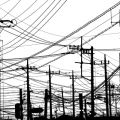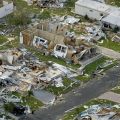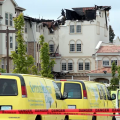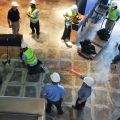Electrical Safety Tips for Flooding Disasters in Georgia

During a water damage emergency, compromised electrical systems and components have the potential to cause damages or injury. Whether the flood was caused by a water leak or a natural disaster, any type of flooding would require electrical safety precautions, as the dangers associated with live electricity during and after a flood must be taken seriously. These include electric shock, electrical fires and, in serious cases, death. ServiceMaster by LoveJoy has compiled these electrical safety precautions for flooding events to keep you and your family safe.
What to Do During a Flood
During a flooding event, some of the most severe dangers are usually associated with your electrical systems. Keep these tips in mind when dealing with an active flood:
DOs:
- Avoid areas where sparks or buzzing or popping noises are observed.
- Watch out for acrid smells or burning-plastic odors, which may be indicative of an electrical fire.
- Avoid getting in contact with overhead power lines or downed power lines when doing cleanup and other activities.
- Shut off the electrical system at the main circuit breaker when sparks or a burning odor is observed, given that it hasn't been in contact with water.
- Connect with your utility company when using electrical equipment.
- Follow all the electrical safety precautions from the Electrical Safety Foundation International (ESFI).
DON'Ts:
- Don't step in standing water where electrical devices or outlets are submerged, because it may already be charged with a huge amount of electric current.
- Don't operate water-damaged electrical equipment unless a certified electrician says it's safe to do so.
- Don't touch a downed power line and call the local power company immediately.
- Don't drive through standing water where downed power lines are submerged.
- Don't try to enter standing water to access the main power switch. Leave it to a licensed electrician.
- Don't attempt to connect generators to your electrical circuits without the proper automatic-interrupt devices.
What to Do After a Flood
- After a flood, your electrical system may be susceptible to bacteria and mold growth as well as structural weakness after prolonged exposure to standing water.
- This moisture can also result to rust and corrosion and damage electrical elements beyond repair.
- Consult a certified electrician to examine your electrical system for defects and damages.
- A lot of components may have to be replaced, such as:
- circuitry, outlets, switches and wiring
- electronics
- fixtures
- HVAC equipment
- major appliances, especially those with a motor
- water heaters
- After electrical hazards have been contained, immediately call a team of professional water damage restoration specialists, such as ServiceMaster by LoveJoy of Georgia, to assess the extent of the damage, create a customized restoration plan, and return your home to pre-loss condition.
Electrical systems, components and equipment are often complex and dangerous, and these dangers are increased with the occurrence of flooding events or other water damage incidents. Follow these electrical safety tips to keep yourself and others safe.
Contact Us for Flood Water Damage Restoration in Conyers, Georgia
If your water damage emergency can't wait, ServiceMaster by LoveJoy is on-call 24 hours a day, 7 days a week, 365 days a year. We service residential and commercial properties in Atlanta, Roswell , Sandy Springs, Marietta, Decatur, Stockbridge, Conyers, McDonough, Stone Mountain, Covington, Social Circle, Dekalb County, Fulton County, Georgia and surrounding areas.
- Contact us at (678) 293-0297 for customers near Conyers, GA and (770) 983-6665 for customers near Roswell, GA.
- We offer a FREE inspection and estimate.
- You may connect with us online to schedule an appointment.
- Check our offices in these areas:
Conyers, GA: 700 Blacklawn Road Southwest Conyers, GA 30012
Covington, GA: 4905 Highway 20, Covington, GA 30016









